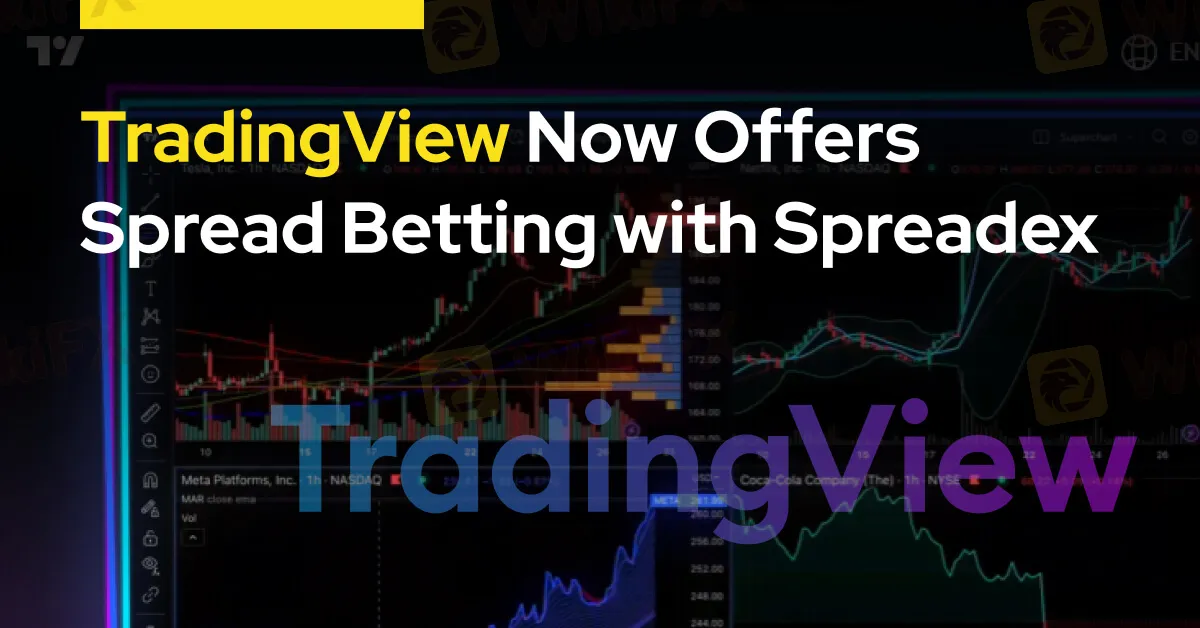简体中文
繁體中文
English
Pусский
日本語
ภาษาไทย
Tiếng Việt
Bahasa Indonesia
Español
हिन्दी
Filippiiniläinen
Français
Deutsch
Português
Türkçe
한국어
العربية
TradingView Now Offers Spread Betting with Spreadex
Abstract:TradingView, a social trading and charting platform, recently expanded its collaboration with UK-based brokerage Spreadex to incorporate spread betting functionality, as announced on Tuesday.

TradingView, a social trading and charting platform, recently expanded its collaboration with UK-based brokerage Spreadex to incorporate spread betting functionality, as announced on Tuesday.
With this integration, TradingView users can now seamlessly access spread betting features directly from TradingView's charting interface while logged into their Spreadex brokerage accounts.

TradingView, with a vast user base exceeding 30 million globally, integrates with various data feeds to grant users access to over 1.3 million financial instruments worldwide. The company has experienced robust growth in recent years as retail traders increasingly turn to social trading platforms.
Spreadex, established since 1999, is a reputable provider of contracts for difference (CFDs) and spread betting services. Spreadex joins a growing roster of brokers collaborating with TradingView to offer trading capabilities directly through the platform's advanced charting interface. Noteworthy partners include FxPro, Oanda, and AMP Global.
To utilize spread betting through TradingView, users need to log into their Spreadex brokerage account via the trading panel and look for symbols prefixed with “SPREADEXSB:” in the platform's symbol search function. This enhancement adds to Spreadex's existing range of tradable instruments on TradingView, encompassing index CFDs, stock CFDs, and currency pairs.

Spread betting and trading CFDs both involve speculating on the price movements of various assets without owning the underlying asset. However, there are key differences between the two. In spread betting, investors bet on whether the price of an asset will rise or fall within a certain time frame, with profits or losses determined by the accuracy of the bet and the size of the market movement. Spread betting allows investors to profit from both rising and falling markets and is often exempt from certain taxes, such as stamp duty and capital gains tax. On the other hand, trading CFDs involves buying or selling contracts based on the price movements of assets, with investors entering into contracts with a broker to exchange the difference in the value of the underlying asset between the time the contract is opened and when it is closed. While both spread betting and trading CFDs offer opportunities to profit from market movements, they differ in their mechanics and tax implications.

Disclaimer:
The views in this article only represent the author's personal views, and do not constitute investment advice on this platform. This platform does not guarantee the accuracy, completeness and timeliness of the information in the article, and will not be liable for any loss caused by the use of or reliance on the information in the article.
Read more

Bitpanda Secures Full Broker-Dealer License in Dubai
Bitpanda has officially obtained a full broker-dealer license from the Dubai Virtual Assets Regulatory Authority (VARA), marking a significant milestone in its international expansion. This approval, which follows preliminary authorization granted three months earlier, enables the European digital asset exchange to introduce its comprehensive suite of virtual asset services to investors in the United Arab Emirates (UAE).

Interactive Brokers Expands Crypto Trading with Solana, XRP, Cardano, and Dogecoin
Interactive Brokers adds Solana, XRP, Cardano, and Dogecoin to its platform, enabling U.S. and U.K. clients to trade crypto 24/7 with low fees.

Gold Surges to New Highs – Is It Time to Buy?
Recently, gold prices have once again set new records, surpassing $3,077 per ounce and continuing a four-week winning streak. Is It the Right Time to Invest?

Why Does the Yen's Exchange Rate Fluctuate Repeatedly?
JPY Exchange Rate Fluctuations: How Should Investors Respond?
WikiFX Broker
Latest News
Enlighten Securities Penalized $5 Million as SFC Uncovers Risk Control Failures
Why Are Financial Firms Adopting Stablecoins to Enhance Services and Stability?
Experienced Forex Traders Usually Do This Before Making a Lot of Money
Octa vs XM:Face-Off: A Detailed Comparison
When High Returns Go Wrong: How a Finance Manager Lost RM364,000
Bridging Trust, Exploring Best—WikiEXPO Hong Kong 2025 Wraps Up Spectacularly
Fidelity Investments Explores Stablecoin Innovation in Digital Assets Sector
Interactive Brokers Expands Crypto Trading with Solana, XRP, Cardano, and Dogecoin
SEC Ends Crypto.com Probe, No Action Taken by Regulator
Why More People Are Trading Online Today?
Currency Calculator







